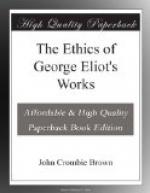In the ‘Mill on the Floss,’ the moral interest of the whole drama is concentrated to a very great degree on Maggie Tulliver; and in her is also mainly concentrated the representative struggle between good and evil, the spirit of the Cross and that of the world; for Stephen Guest is little more than the objective form under which the latent evil of her own humanity assails her. Her life is the field upon which we see the great conflict waging between the elements of spiritual life and spiritual death; swaying amid heart-struggle and pain, now toward victory, now toward defeat, till at last all seems lost. Then at one rebound the strong brave spirit recovers itself, and takes up the full burden of its cross; sees and accepts the present right though the heart is breaking; and the end is victory crowned and sealed by death.
From her first appearance as a child, those elements of humanity are most prominent in her which, unguided and uncontrolled, are most fraught with danger to the higher life; and for her there is no real outward guidance or control whatever. The passionate craving for human sympathy and love, which meets no fuller response than from the rude instinctive fondness of her father and the carefully-regulated affection of her brother, on the one hand prepares her for the storm of passion, and on the other, chilled and thrown back by neglect and refusal, threatens her with equal danger of hardness and self-inclusion. The strong artist temperament, the power of spontaneous and intense enjoyment in everything fair and glad to eye and ear, repressed by the uncongenial accessories around her, tends to concentrate her existence in a realm of mere imaginative life, where, if it be the only life, the diviner part of our being can find no sustenance. This danger is for her the greater and more insidious, because in her the sensuous, so strongly developed, is refined from all its grossness by the presence of imagination and thought.
When at last, amid the desolation that has come upon her home, and the increasing bareness of all the accessories of her young life, its deeper needs and higher aspirations awaken to definite purpose and seek definite action, the direction they take is toward a hard stern asceticism, cramping up all life and energy within a narrow round of drudgeries and privations. She strives, as many an earnest impassioned nature like hers has done in similar circumstances, to fashion her own cross, and to make it as hard as may be to bear. She would deny to herself the very beauty of earth and sky, the music of birds and rippling waters, and everything sweet and glad, as temptations and snares. From all this she is brought back by Philip. But he, touching as he is in the humility and tender unselfishness of his love, is too exclusively of the artist temperament to give direction or sustainment to the deeper moral requirements of her being. He may win her back to the love of beauty and the sense of joy; but he is not the one to stand by her side when the stern conflict between pleasure and right, sense and soul, the world and God, is being fought out within her.




